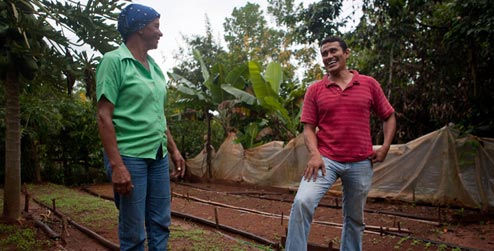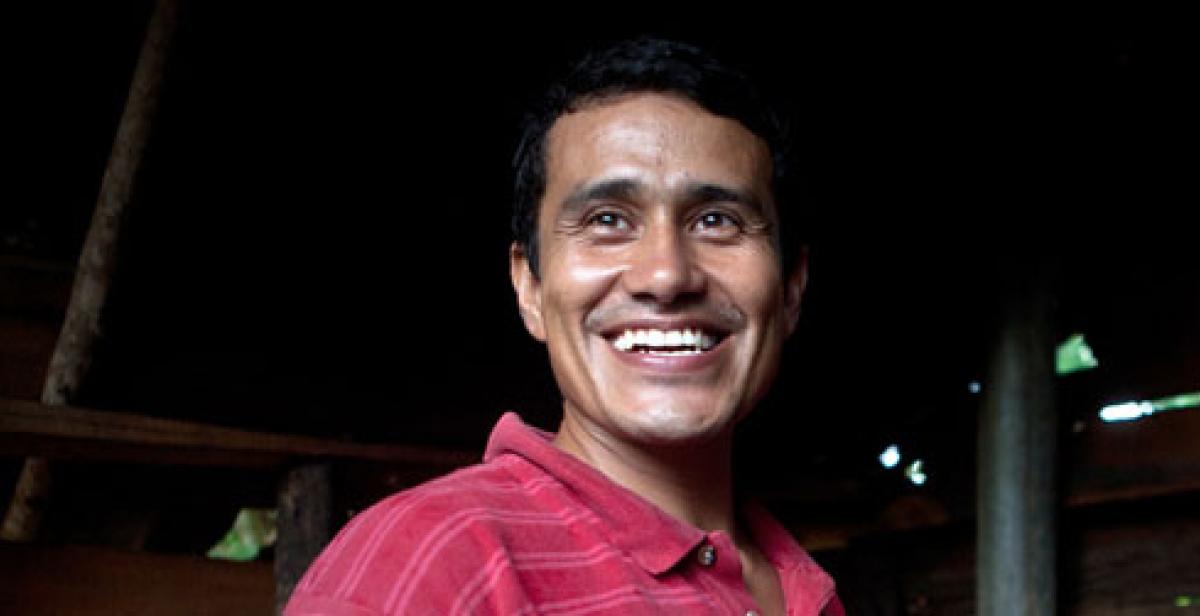Our Food for a better future project ended in December 2013. Thank you so much for your support – here’s Bernardo's final report on his work with the communities of the Dajabón/Restauración area in the northern border of the Dominican Republic.
Developing together
I believe that our greatest achievement is the knowledge and skills that we have developed together.
The greatest difficulty that can occur in a process is not being with the community, not wanting to be part of it. But if you are able to identify yourself with them and feel their needs, you know that the work will be valued as something that comes from them, for them.
Adapting to the context
Thanks to the team and the institution (at partner organisation Solidaridad Fronteriza), we were able to test and explore, giving us a wide range of opportunites to conduct actions and work that benefits communities. Perhaps the practices and methodologies have not been all new, but these were tested and proved in practice and adapted to the context.
Working in the field
During the time I was with the communities in the field, I felt more useful – above all, knowing that we are part of a whole, that each can provide a helping hand to the other. The work and support I could contribute was just a small part of the effort of the communities, and I hope that they will continue to build on the work and support this development process.
Living in a paradise
I believe we can see a general change in communities and that they can continue to grow and to improve their living conditions and manage and protect the environment that surrounds them, which is nothing more than living in a green paradise surrounded by the ocean.

Final activities before ending the project:
- Thanks to our work on agro-forestry production and the establishment of community agro-forestry farms, Solidaridad Fronteriza and the local farmers’ organizations are maintaining an area of diversified and sustainable farming, which favors both the local economy of the associations and families. The next step will be to focus on marketing the products. The last activities I supported helped to consolidate the necessary conditions, a stable and sustainable production and good-quality and ecological products. Now it’s important that these achievements don’t get lost and efforts need to be put into a marketing process.
- In the last stage we finished the process of the installation of 75 plots; 22 plots for coffee production are in the process of rehabilitation and promotion. 157ha were made ready for installation of agro-forestry plots, allowing us to both produce and protect natural resources with the new sustainable production models that have been introduced. In this installation process, each beneficiary is developing the whole farm planning system, which allows them to improve production systems and to make better use of all areas of the farm.
- For other farmers’ associations, we have installed 7 modules of production of organic fertilizers. The aim is to promote and enable the organic management of crops, as part of a strategy to introduce techniques for future certification of crops and improved marketing opportunities.
- We also finished with the monitoring process of 85 small family gardens, which enabled families to introduce new products into their diet and improved their access to food. The families increased considerably their awareness and knowledge on agricultural diversification and its importance for family resources as well as the sustainable management of natural resources.
- In the last weeks I finished the systematization of the experience and working methodology linked to sustainable production, including development of farm plans, demarcation of land, identification of needs and project development dynamics. In teamwork with Oscar and representatives of our beneficiary farmers’ associations, we collected information and analyzed it in order to capture the learning from the experience of Solidaridad Fronteriza and UNAPROBOSQUE from 2005 to 2013, in particular regarding the implementation of agro-forestry systems.
- This systematization is a huge success and an important source for knowledge and learning, which can be shared with grassroots organizations and other institutions working in this area. For this purpose, training manuals in natural resource management and the implementation of agroforestry systems have been put together as well.
Friends and colleagues
I believe my time here has contributed to our shared development: myself, my colleagues, the communities and beneficiaries. It saddens me to write this report as it is my last step to leave behind people who I learned to love and value as exceptional friends and colleagues.
I give thanks to them – and also apologize for all my demands and any difficulties I have caused! This is special thanks to my friends UNAPROBOSQUE, Solidaridad Fronteriza and especially Progressio, for this beautiful opportunity that I lived.
Thank you for your support for this project – we could not have done it without your help. Progressio has similar projects planned for the northern border area in 2014, so please continue to support our work with poor and marginalised people and communities – thank you!
Photos (from top):
1) Bernardo Lopez
2) Bernardo with Amparo Jimenez in her food garden in El Carrizal near Restauracion
All photos © Fran Afonso/Progressio



